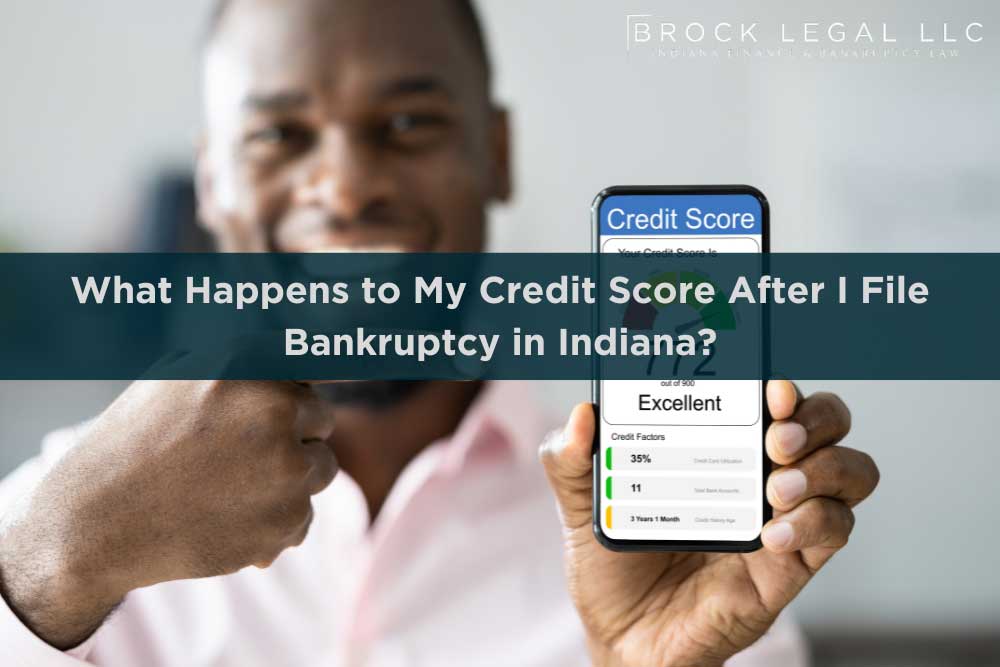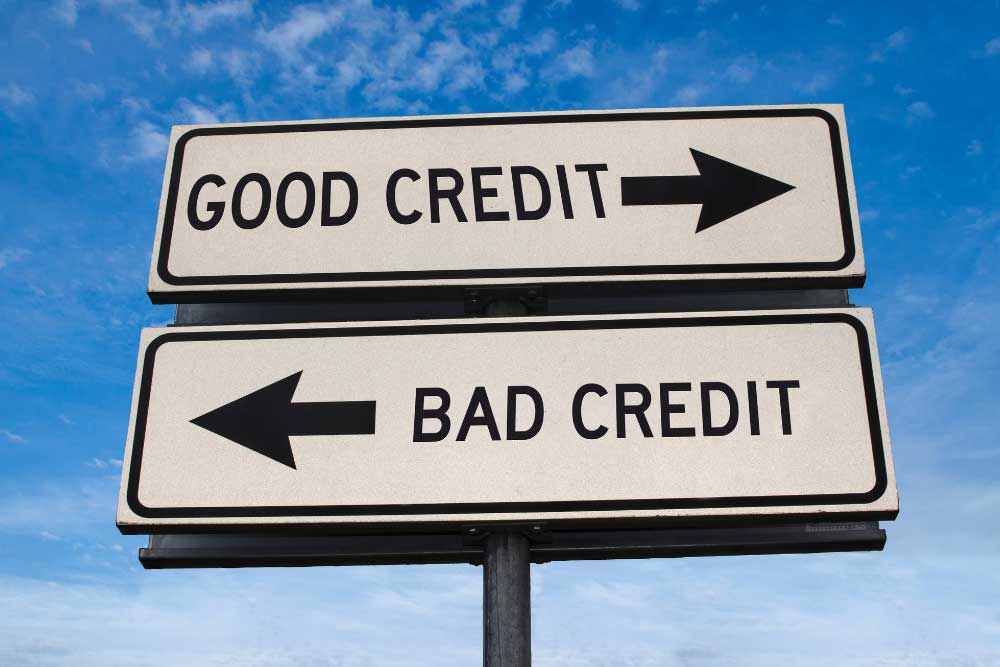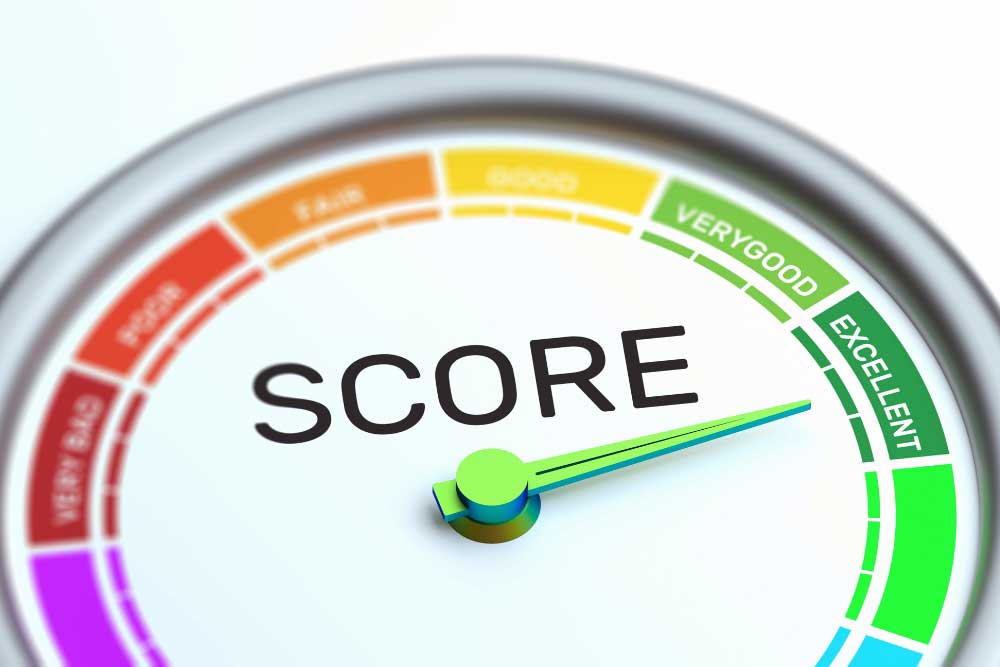What Happens to My Credit Score After I File Bankruptcy in Indiana?
by Attorney S. Zachary T. Brock

Table of Contents
Credit Score After Bankruptcy in Indiana: What to Expect
Filing for bankruptcy is a major decision, and it does affect your credit. Most people see a sharp drop in their score right after filing because a bankruptcy public record and a group of negative account updates hit the reports at the same time. The size of the drop depends on your starting score and what is already on your reports. A person with a higher starting score often sees a larger fall in points, while someone with late payments and collections may see a smaller change because much of the damage is already reflected.
That first dip is not the end of the story. As discharged accounts update to a zero balance and you add fresh on time payments after the case, your score can stabilize and begin to climb. The pace of that recovery is driven by habits in the months that follow your filing, not just by waiting for time to pass.
How Long Bankruptcy Stays on Your Credit Reports
The length of time a bankruptcy remains on your credit reports depends on the chapter and the bureau that is reporting. Chapter 7 can remain for up to 10 years and Chapter 13 usually remains for 7 years from the filing date, with removal handled automatically when the period ends.
Guidance can vary, and there are limited situations where reporting could extend longer. The practical takeaway is that most Chapter 13 cases fall off after seven years, while Chapter 7 is commonly reported for the full ten.
When the public record is removed, the accounts included in the case should already show zero balances and a notation that they were discharged or included in bankruptcy. Those accounts will age off by their own timelines, which reduces the weight they have on scoring as they get older.
Learn more about Chapter 7 and Chapter 13 Bankruptcy in Indiana.

A Realistic Timeline for Credit Recovery
Every file is different, but most Indiana clients follow a pattern like this:
- First 30 to 60 days after filing: Expect the bankruptcy public record to appear and many accounts to update. Pull your reports to watch for wrong balances or late payments dated after your filing, then dispute any errors. Begin tracking your score monthly through the bureaus.
- Three to six months after filing or discharge: Add one small line of new credit that reports to all three bureaus, such as a secured card. Keep the limit low and pay in full each month. If you use a credit builder loan through a bank or credit union, set payments on auto pay.
- Six to twelve months: Keep credit card use low relative to the limit, and continue perfect on time payments on every bill. Consider becoming an authorized user on a family member’s well managed card if they agree. Avoid hard inquiries unless they support your plan.
- Twelve to twenty four months: Lenders begin to care more about your new history than your past if you show a clean streak of payments and sensible balances. Some people see meaningful score gains during this window as the fresh positive data outweighs the older negatives.
Steps to Rebuild Your Credit in Indiana
The fastest progress comes from consistent, simple actions:
- Check all three credit reports and fix errors. Use Annual Credit Report to download reports and dispute any post filing late marks, wrong balances, or accounts not coded as included in bankruptcy. Keep PDFs of each report and your dispute letters.
- Open one secured card that reports to all bureaus. Put one small, predictable expense on it and pay in full before the statement closes. Ask if the issuer will review for an unsecured upgrade after six to twelve months of perfect payments.
- Consider a credit builder loan with a local credit union. These loans are designed to build payment history. Automate the payment from checking so you never miss.
- Keep utilization low. Use less than one third of your card limit and let low balances report. Utilization is a large scoring factor, so low usage helps month after month.
- Limit new applications. Hard inquiries can trim points for a time and too many can signal risk. Apply only for credit that fits your plan.

What Lenders Look At After Bankruptcy
Credit decisions after a bankruptcy are about risk and evidence. Many lenders weigh payment history since your filing, how you use credit limits, and the mix of credit you have rebuilt. A long stretch of on time payments and low balances is more convincing than a higher score with thin history.
For installment loans, underwriters also consider income stability, debt to income ratio, and savings. A healthy down payment and a record of twelve months of on time payments on new accounts can help. The bankruptcy entry still matters while it is on the report, but its weight fades as current behavior looks stronger.
Mortgage and auto lenders may apply their own seasoning rules and require extra documentation. That is why it helps to ask a lender which milestones they want to see rather than guessing. If a lender says no today, ask what would change that answer in six or twelve months and build a checklist around it.
Mistakes That Slow Your Comeback
Avoiding a few common traps can save months of progress:
- Missing any payment. One late mark can undo months of good work. Set auto pay and calendar reminders for every bill.
- Applying for too much new credit. Each hard inquiry dings your score for a time and many in a row can spook lenders. Space out applications and only seek needed accounts.
- Falling for quick fix credit schemes. Be wary of companies that promise to delete accurate negatives or add rent tradelines that do not report properly. Learn your rights under credit repair and reporting laws.

Indiana Specific Tips and Local Resources
The steps above apply everywhere, but a few local habits can help. Many Indiana clients rebuild faster by using a community bank or credit union for a secured card or a credit builder loan, since local lenders tend to look closely at recent payment behavior and personal banking history. Your bankruptcy attorney can also point you to credit education resources offered to clients after discharge, and some firms provide a guided program to keep you on track month by month.
It also helps to treat your credit reports like business records. Save PDFs after every update, keep copies of dispute letters, and track corrections in a simple spreadsheet. When you later apply for a mortgage or car loan, this paper trail shows care and consistency.
FAQs: Credit Score After Bankruptcy in Indiana
There is no single number, but large drops are common, especially for higher starting scores. Many people see a triple digit change. What matters most is how quickly you build a new positive history after filing.
Chapter 7 usually remains for up to ten years. Chapter 13 is commonly removed after seven years from the filing date. Removal happens automatically.
Yes, many people start with a secured card that reports to all three bureaus. Use it for small purchases and pay in full each month. Over time you may be reviewed for an unsecured card if the account stays in good standing.
Some lenders view Chapter 13 more favorably because you repay part of your debt during the plan. That does not guarantee approval, but it can help when paired with strong recent payment history and low utilization.
On time payments every month, followed by low card balances compared to limits. These two factors influence a large share of your score, and they are fully within your control.
Talk With Brock Legal About Your Next Step
If debt has taken over your days and nights, you do not have to face it alone. Brock Legal helps people across Indiana file smart cases and rebuild credit with steady guidance. We explain each option in plain language, set clear expectations, and stay with you from the first call through the final discharge.
Your plan will match your goals and your budget. You will know the costs up front and you will always understand what comes next. We offer phone and video meetings for your convenience, and in person appointments when you prefer to meet at the office.
Ready to move forward. Call 317.505.0336 or email zach@indyfinancelaw.com to schedule your free consultation with Brock Legal. We are ready to help you protect what matters and start your credit comeback.
Attorney S. Zachary T. Brock

Attorney S. Zachary T. Brock
Zach empowers individuals faced with financial challenges by providing them with effective solutions and unwavering support in the areas of consumer finance and bankruptcy law.
By actively listening and empathizing with each client, Zach works to gain a deep understanding of every individual or family’s unique circumstances. This helps him tailor his legal strategy to best meet the needs of each client.
“No matter what may be weighing you down financially, Brock Legal is here to help. My mission is to help navigate you through whatever stressful circumstance you may be faced with, by offering unparalleled education and service in the areas of consumer finance and bankruptcy law. Let us show you how our firm can help. Contact Brock Legal today!”
-Zach



